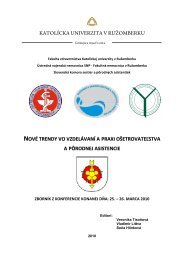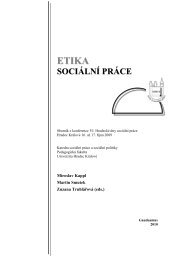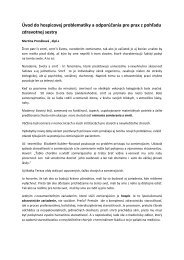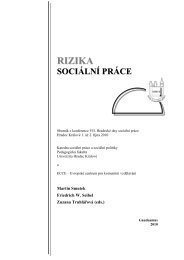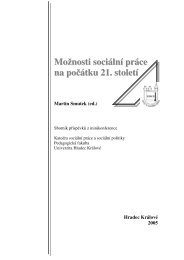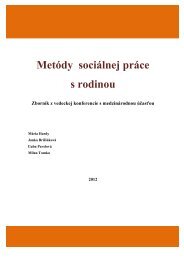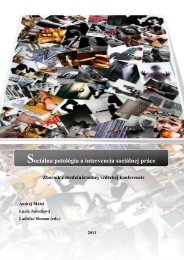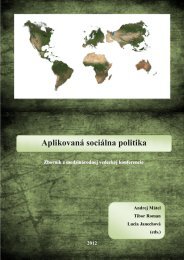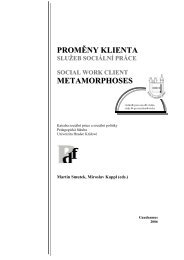Zmena klÃmy â možný dopad (nielen) na obyvateľstvo - Prohuman
Zmena klÃmy â možný dopad (nielen) na obyvateľstvo - Prohuman
Zmena klÃmy â možný dopad (nielen) na obyvateľstvo - Prohuman
You also want an ePaper? Increase the reach of your titles
YUMPU automatically turns print PDFs into web optimized ePapers that Google loves.
ESD is still developing as a broad and comprehensive concept, encompassing interrelated<br />
environmental, economic and social issues. Environmental education<br />
should be elaborated and complemented with other fields of education in an integrative<br />
approach towards education for sustai<strong>na</strong>ble development. Addressing<br />
such divers themes in ESD requires a holistic approach. ESD should foster respect<br />
for and understanding of different cultures and embrace contributions from them.<br />
Traditio<strong>na</strong>l knowledge should be valued and conserved as an integral part of ESD.<br />
Learners at all levels should be encouraged to use systemic, critical and creative<br />
thinking and reflection in both local and global contexts; these are prerequisites<br />
for action for sustai<strong>na</strong>ble development. ESD should take into account diverse local,<br />
<strong>na</strong>tio<strong>na</strong>l and regio<strong>na</strong>l circumstances as well as the global context, seeking<br />
a balance between global and local interests. Addressing the ethical dimension,<br />
including … is central to sustai<strong>na</strong>ble development and, therefore, vital for ESD.<br />
Responsibility is inherent in ethics and becomes a practical matter for ESD. Formal<br />
ESD should be permeated by experience of life and work beyond the classroom.<br />
ESD requires multi-stakeholder cooperation and partnership. ESD should therefore<br />
be recognized for its contribution to interactive and integrated policy- and<br />
decision-making.<br />
The role of education for sustai<strong>na</strong>ble development<br />
in shifting to a green economy<br />
The economic paradigm of greening the economy, against the background of multiple<br />
crises and accelerating resource scarcity, has gained paramount prominence<br />
in regio<strong>na</strong>l and inter<strong>na</strong>tio<strong>na</strong>l sustai<strong>na</strong>ble development processes. It was a key theme<br />
at the United Nations Conference on Sustai<strong>na</strong>ble Development held in Rio de<br />
Janeiro in June 2012 (Rio+20).<br />
The working definition of UNEP describes a “green economy as one that results<br />
in improved human well-being and social equity, while significantly reducing<br />
environmental risks and ecological scarcities. In its simplest expression, a green<br />
economy can be thought of as one which is low carbon, resource efficient and socially<br />
inclusive.” (UNEP, GEI) While the importance of promoting a green economy<br />
is widely supported regio<strong>na</strong>lly and globally, there is no universal agreement on the<br />
definition of what a green economy entails. At the regio<strong>na</strong>l level, the relevant substantive<br />
document for the Seventh “Environment for Europe” Ministerial Conference<br />
states that, in order to achieve a green, inclusive and competitive economy<br />
in the UNECE region, a comprehensive policy mix will be needed. The policy mix<br />
141





